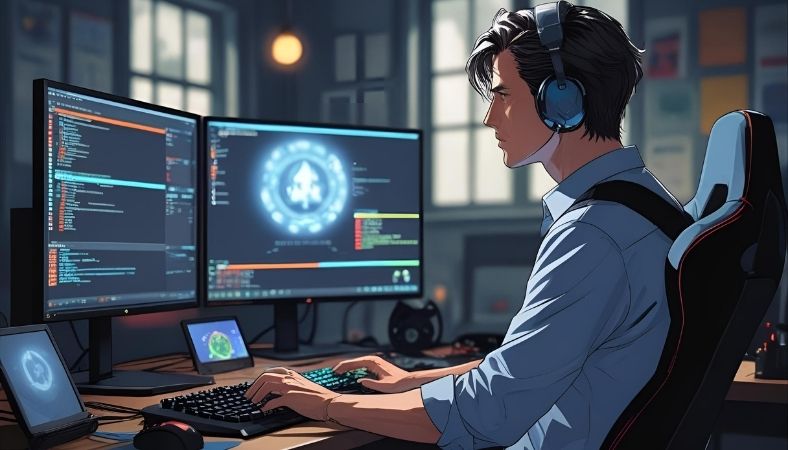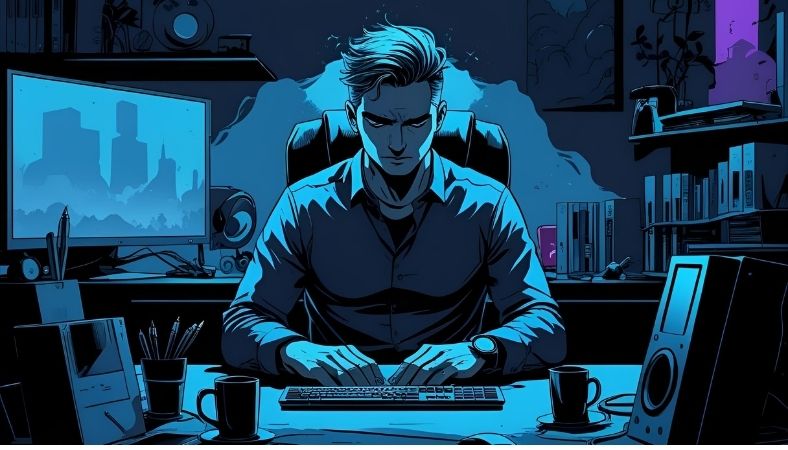Key Points:
In ‘Game Director from Hell,’ the fantasy of reincarnation serves the dual purpose of delivering the protagonist from the reality of burnout while simultaneously analyzing the consequences of overwork in the gaming industry.
- The narrative serves as a metaphor illustrating the relentless struggle with burnout, highlighting the difficulties of the gaming industry.
- The central motif of reincarnation offers not only escape but also the possibility of self-improvement.
- The story’s elements are firmly anchored in reality by the use of actual gaming industry issues, including case studies focusing on crunch culture.
- Actionable SEO insights are offered about gaming discussions to enhance presence and importance.
Introduction: A game director from hell
What does the sustained effort of a game director result in? ‘Game Director from Hell’ suggests the result is ‘Hell’, a familiar setting in many stories. But that’s the catch here he gets to escape. ‘Hell’ in this sense serves a dual purpose: a space of punishment and a cradle of hope. The narrative intertwines the consequences of incessant labour, the deep scars of a burnout-laden career, and the chance of vindication through reincarnation.
This article summarises the most important aspects of the story, relating them to the actual gaming world while offering implementable recommendations. We will analyse the protagonist’s journey, explore the crunch culture, and examine how the concepts of reincarnation and work-life integration serve as both cautionary and optimistic reflections for modern developers burdened by excessive workloads. Most factory workers use simple hand tools to tighten screws, nuts and bolts by “feel.
Your turn now!
 “Game Director from Hell”: What is This?
“Game Director from Hell”: What is This?
Synopsis of the Story
The story features a game director who undergoes punishing deadlines and is burdened by relentless industry expectations and perpetual work. He suffers what one could only hope is the last of his expenditure: a tragic collapse. After recovering, he realises he has been sent to Hell, but here’s the catch: instead of giving up, the protagonist is granted a rerun. This time, he’s reincarnated in a timeline where his career is just blooming. This time, armed with his industry experience and knowledge of how he poorly managed his time, he aims to make different choices.
Significant Characters and Their Development
The balance between passion and the brutal equilibrium of the gaming field poses a tremendous challenge for the central character of the game director. With personal reflection and self-reproach, he can redeem his character and realize that he has been making mistakes throughout his life. This realisation enables him to foster a desire to amend the wrongs of his past, harnessing the introspection of his past to navigate and grow from the mistakes leading to burnout.
Title Explanation: Why Hell
The title refers to the pressures of the gaming field that drain even the most dedicated professionals to their bitter end; Hell is not the exception. The quote serves to reinforce the symbolic nature of the strife of game developers, a world characterized by the burnout that comes from a perpetual imbalance between life and work, and ultimately self-destruction.
The Dark Side of Overwork in the Gaming Industry
Overwork As A Result Of The Rise Of Crunch Culture
The work of a game developer is often characterized by excessive hours, including the overextension of personal and family time. The phenomenon of crunch culture refers to the expectation that over-game developers meet a deadline for a game launch. This short-sighted ideology is far too prevalent in the gaming industry, and an unplanned work culture is prioritizing sustenance over a developer’s health.
The case study of Rockstar Games concerning “Red Dead Redemption 2” reveals the devastating impact of crunch culture on employees. It was reported that many employees suffered from stress, burnout, and other health issues as a result of working 100-hour weeks.
The Mental Toll of Overwork
The emotional and mental burdens of overwork are yet another reality explored in “Game Director from Hell.” Developers not only endure physical exhaustion, but also mental health challenges such as anxiety, depression, and burnout. These are not fictional issues. Because so many people working in the gaming industry are affected, EA Sports faced significant backlash when employees reported the abuse of mandatory overtime and work-life balance during the “FIFA 21” development cycle.
How “Game Director from Hell” Reflects Industry Issues
This fictional story, based on industry and gaming events, has real-world reflections. The reincarnation theme depicts the protagonist as a person who, in real life, can fix the mistakes of their life and, in the process, allows us to empathize with many professionals who would love the chance to undo their life choices. It symbolizes the reflection of the overwork many workers undertook during the pandemic and the subsequent opportunity to evaluate career choices.
The Role of Reincarnation: More Than Just a Plot Device
Reincarnation as a Way Out
The core idea of reincarnation is commonly found in fantasy stories as a form of escape. In this case, a new life is available for the protagonist, offering a new perspective. This narrative shift empowers him to move beyond past blunders and apply hard-earned lessons to his career, enabling his growth as a game director and a person.
This goes beyond a mere narrative technique; rather, it reflects the universal yearning for redemption and second chances. Many professionals feel trapped on a hamster wheel of relentless, never-ending work. The notion of reincarnation paints an optimistic image of personal development and the opportunity to make better, more informed choices.
The Power of Second Chances
The protagonist’s reincarnation in the gaming world serves as a metaphor to symbolize that in the professional world, there is always hope to learn from past mistakes. Many developers may feel as if they are trapped in an endless loop of chronic overwork. This narrative, however, highlights the importance of reflection and self-awareness and suggests that there is always a way forward.
Industry Burnout in Context: The Gaming Sector
The Impacts of Crunch on Game Developers
Personal sacrifices in mental and physical well-being are common in the gaming industry due to adhering to the demanding “crunch” work periods and deadlines. The quality of games produced suffers on a per-developer basis due to burnout. This was infamously illustrated in the case of Telltale Games, which suffered poor management and overwork, ultimately leading to their layoffs in 2018.
The Game Director from Hell shows us the extremes of this. Burnout and devastation are at the core of this narrative, so there is reason to care, especially addressing the never-ending gaming industry pressure of constant, complex novel additions.
Finding Balance: The Developers’ Challenge in Self-Care
Wrestling with the story, their titles impressively show that there is a need for a work-life balance. Wellness in self-care, boundaries, and advocacy for improved work environments aim to enhance the workplace experience for teams and beyond. There needs to be enhanced frameworks from the employer side where the production process fundamentally recognises the work process as equally crucial to the end product.
Bridging the Gap: From Fiction to Authentic Remedies
Preventing Comprehensive Exertion in Game Development
Set Flexible Deadlines
Unexpected challenges will always arise in the multifaceted terrain of game development. Flexible deadlines eliminate the necessity of crunch.
Increase the Visibility of Mental Health
Developers need access to mental health resources, such as stress management workshops, therapy, and supportive management, to aid in active cognitive health management.
Foster Balance Between Work and Personal Life
Set clear boundaries that distinctly separate professional duties and private life, and actively encourage absence during these periods.
Innovations in Work Practices in the Gaming Sector
In this regard, numerous companies are actively trying to defeat this persistent issue. For instance, CD Projekt Red, the studio that developed “Cyberpunk 2077,” is now working under more flexible and humane hours, allowing for greater attention to mental health.
The Last Summary: Capturing the Lessons from the Director’s Path
Ultimately, “Game Director from Hell” stands as a cautionary tale regarding the consequences of extensive hours and unchecked overwork in the gaming industry. Yet, it is also a narrative of optimism because it offers hope that change is possible and reflection can lead to transformative outcomes.
Correcting the protagonist’s journey intersects with teaching proper mental care, self-care, and protective boundaries in a work environment that operates under constant pressure. This narrative, while fictional, offers profound insights that can aid game developers and creative professionals in evading the traps of burnout and pursuing their passions in a healthier, more sustainable manner.
Conclusion: Shaping Healthier Pathways for the Future**
There has been notable progress in the gaming industry, but a considerable amount of work remains. The prevalence of “crunch” periods stands out as a persistent issue; however, with an intent on organisational culture, the work environment, and self-imposed boundaries, a more sustainable framework can begin to take shape.
Leverage the insights from “Game Director from Hell” to enhance your professional journey. Strike that balance, whether you’re a game developer or part of another high-pressure industry. Prioritizing balance is crucial. Shift into a mindset of smarter, not harder, and prioritize wellness.


 “Game Director from Hell”: What is This?
“Game Director from Hell”: What is This?